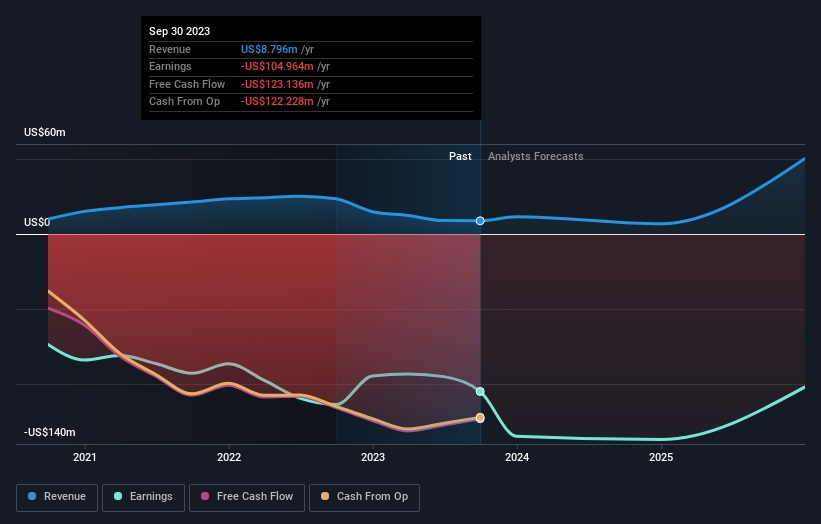individual investors who own 35% along with institutions invested in Syros Pharmaceuticals, Inc. (NASDAQ:SYRS) saw increase in their holdings value last week
Key Insights
Syros Pharmaceuticals' significant individual investors ownership suggests that the key decisions are influenced by shareholders from the larger public
The top 10 shareholders own 52% of the company
Every investor in Syros Pharmaceuticals, Inc. (NASDAQ:SYRS) should be aware of the most powerful shareholder groups. And the group that holds the biggest piece of the pie are individual investors with 35% ownership. Put another way, the group faces the maximum upside potential (or downside risk).
While individual investors were the group that reaped the most benefits after last week’s 22% price gain, institutions also received a 33% cut.
In the chart below, we zoom in on the different ownership groups of Syros Pharmaceuticals.
View our latest analysis for Syros Pharmaceuticals
What Does The Institutional Ownership Tell Us About Syros Pharmaceuticals?
Many institutions measure their performance against an index that approximates the local market. So they usually pay more attention to companies that are included in major indices.
As you can see, institutional investors have a fair amount of stake in Syros Pharmaceuticals. This can indicate that the company has a certain degree of credibility in the investment community. However, it is best to be wary of relying on the supposed validation that comes with institutional investors. They too, get it wrong sometimes. If multiple institutions change their view on a stock at the same time, you could see the share price drop fast. It's therefore worth looking at Syros Pharmaceuticals' earnings history below. Of course, the future is what really matters.
Our data indicates that hedge funds own 7.5% of Syros Pharmaceuticals. That's interesting, because hedge funds can be quite active and activist. Many look for medium term catalysts that will drive the share price higher. Bain Capital Life Sciences Investors, LLC is currently the company's largest shareholder with 10% of shares outstanding. Meanwhile, the second and third largest shareholders, hold 7.5% and 7.0%, of the shares outstanding, respectively.
We also observed that the top 10 shareholders account for more than half of the share register, with a few smaller shareholders to balance the interests of the larger ones to a certain extent.
Researching institutional ownership is a good way to gauge and filter a stock's expected performance. The same can be achieved by studying analyst sentiments. There are plenty of analysts covering the stock, so it might be worth seeing what they are forecasting, too.
Insider Ownership Of Syros Pharmaceuticals
While the precise definition of an insider can be subjective, almost everyone considers board members to be insiders. Company management run the business, but the CEO will answer to the board, even if he or she is a member of it.
I generally consider insider ownership to be a good thing. However, on some occasions it makes it more difficult for other shareholders to hold the board accountable for decisions.
We can report that insiders do own shares in Syros Pharmaceuticals, Inc.. As individuals, the insiders collectively own US$1.7m worth of the US$103m company. This shows at least some alignment, but we usually like to see larger insider holdings. You can click here to see if those insiders have been buying or selling.
General Public Ownership
The general public-- including retail investors -- own 35% stake in the company, and hence can't easily be ignored. While this size of ownership may not be enough to sway a policy decision in their favour, they can still make a collective impact on company policies.
Private Equity Ownership
With an ownership of 23%, private equity firms are in a position to play a role in shaping corporate strategy with a focus on value creation. Sometimes we see private equity stick around for the long term, but generally speaking they have a shorter investment horizon and -- as the name suggests -- don't invest in public companies much. After some time they may look to sell and redeploy capital elsewhere.
Next Steps:
It's always worth thinking about the different groups who own shares in a company. But to understand Syros Pharmaceuticals better, we need to consider many other factors. To that end, you should learn about the 4 warning signs we've spotted with Syros Pharmaceuticals (including 2 which are significant) .
If you would prefer discover what analysts are predicting in terms of future growth, do not miss this free report on analyst forecasts.
NB: Figures in this article are calculated using data from the last twelve months, which refer to the 12-month period ending on the last date of the month the financial statement is dated. This may not be consistent with full year annual report figures.
Have feedback on this article? Concerned about the content? Get in touch with us directly. Alternatively, email editorial-team (at) simplywallst.com.
This article by Simply Wall St is general in nature. We provide commentary based on historical data and analyst forecasts only using an unbiased methodology and our articles are not intended to be financial advice. It does not constitute a recommendation to buy or sell any stock, and does not take account of your objectives, or your financial situation. We aim to bring you long-term focused analysis driven by fundamental data. Note that our analysis may not factor in the latest price-sensitive company announcements or qualitative material. Simply Wall St has no position in any stocks mentioned.


